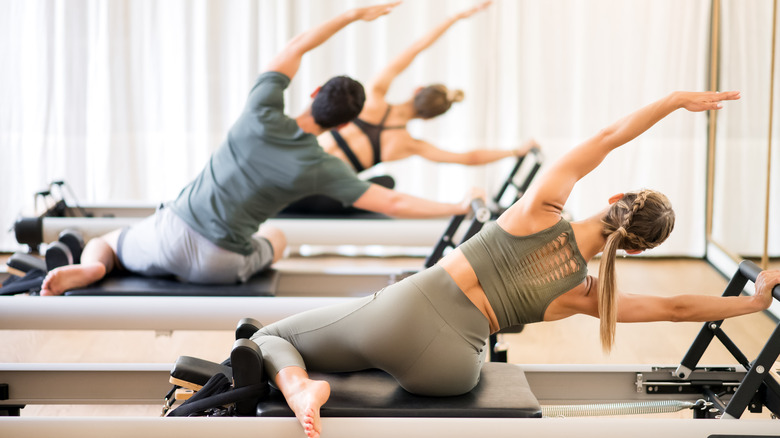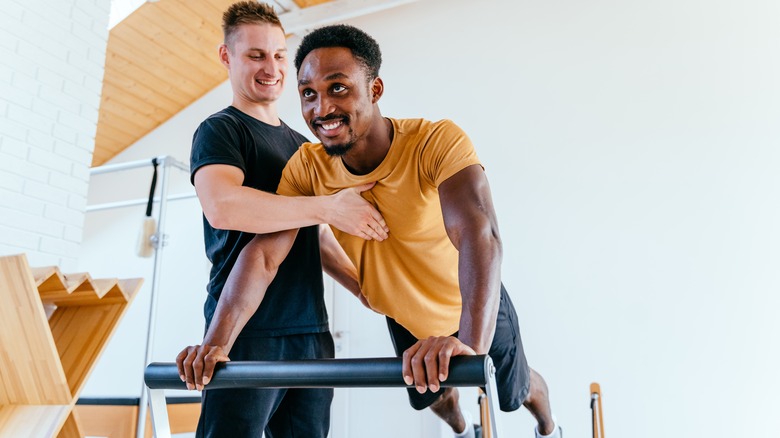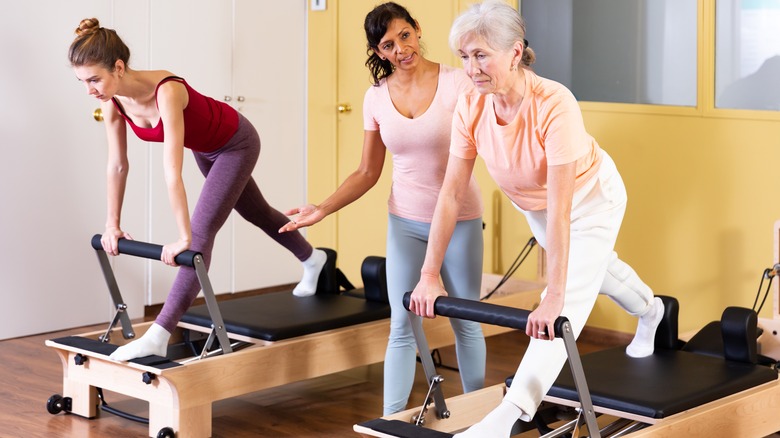What To Expect When Going To A Reformer Pilates Class
Reformer Pilates is a type of Pilates done on a reformer platform. Invented by Joseph Pilates, the platform is a small raised bed on wheels that uses a system of springs to provide adjustable resistance in order to make Pilates workouts more challenging (via Today). There is also a footbar and a set of long straps at the end of the reformer, where you can put your hands and feet.
According to Julie O'Connell, a physical therapist at Athletico Physical Therapy, the purpose of the reformer is to help people achieve the primary goals of Pilates by allowing them to push and pull the reformer with their own weight and strength. These goals include "the use of diaphragmatic breathing to organize the body's posture through coordinated movements with an emphasis on postural control," O'Connell told Today. As a result, reformer Pilates is a great low-impact, full body workout that can help improve core stability and postural alignment.
Wear comfortable clothing and shoes
Reformer Pilates classes are offered at a number of fitness studios and are a great workout for anyone looking to build muscle and improve their posture. According to experts at Byrdie, reformer Pilates classes reformer Pilates classes are usually slightly smaller in size than regular Pilates classes due to the amount of space the reformers tend to take up. They typically last for an hour and are designed to engage your entire body. That's why it's best to wear comfortable clothing and supportive footwear — but not shoes, as you typically don't wear shoes when working on a reformer. Think yoga socks or something similar.
If you're nervous about using a reformer for the first time, don't worry. Your instructor will show you how to use it and adjust it to your height. Depending on the studio, classes can range in price from $20 to $30 per class, with private sessions costing upwards of $50 to $100 per session. "A good Pilates reformer class should be a full-body workout that incorporates dynamic stretching, biomechanical movement, and the type of muscle burn that makes you feel supported and strong the next day vs. in pain," Tara Gordon, the owner and founder of 212 Pilates, told Byrdie.
Benefits of reformer Pilates class
According to LiveStrong, there are many benefits associated with reformer Pilates classes. For instance, reformer Pilates can help improve your flexibility and range of motion. As it turns out, using the reformer can help extend your muscles through their full range of motion, which can enhance mobility. It can also work your muscles in three different ways: concentric, eccentric, and isometric. Concentric movements work to shorten your muscle fibers, while eccentric movements do the opposite by lengthening your muscle fibers, and isometric movements involve holding your body in a static position.
Furthermore, reformer Pilates classes are a low-impact workout, so they're gentle on your joints. They also involve some exercises that are not weight-bearing, such as moves done from a sitting or lying down position. In fact, attending reformer Pilates classes is great for runners, people with arthritis, and people with other conditions that might make high-impact workouts unsafe. It's also a good way to help your body recover from a minor injury, provided that your doctor is on board.



